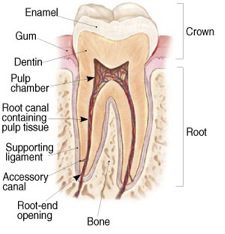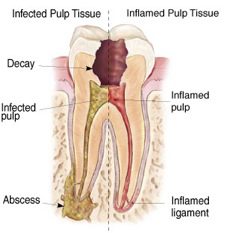FAQs
 What is endodontic (root canal) treatment?
What is endodontic (root canal) treatment?
The dental pulp, the soft tissue inside the tooth commonly called “the nerve”, is made up of connective tissue, nerves, and blood vessels. The main function of the pulp is forming the hard structure of the roots during tooth development. In the fully matured tooth, this tissue is not necessary for the tooth’s health and survival. When the pulp becomes inflamed or infected it is necessary to remove it with endodontic treatment. A common misconception is that we are taking the roots out of the tooth, which is not the case. The best way to think of root canal treatment is that we are cleaning the natural canal system of the tooth and placing a filling to seal the canal(s).
 Why do I need a root canal?
Why do I need a root canal?
The most common reasons the dental pulp may become inflamed or infected are: tooth decay, restorative dental procedures, traumatic injury to a tooth, and a crack or fractured tooth. An endodontic (root canal) procedure will remove the infected or inflamed pulp and alleviate dental pain and/or infection. In many cases this is the best way to save your tooth and keep it healthy.
What are the signs that I might need endodontic treatment?
The most common symptoms include pain, lingering hot or cold sensitivity, tenderness when biting, and swelling. However, often when root canal treatment is necessary there are no symptoms. Your Endodontist is an expert at diagnosing dental pain and infections, and decide with you if an endodontic procedure is right for you.
How will endodontic treatment save my tooth?
Endodontic treatment involves removal of the inflamed or infected pulp, cleaning and shaping of the root canal, and then sealing the canal with a filling material. This removes the source of the infection or inflammation and allows the tooth and surrounding tissues to heal. Once root canal treatment is complete you will return to your dentist who will restore the tooth by placing a crown or other restoration. This is necessary to provide stability to the root canal treated tooth and restore the tooth to its proper function. Although there is no guarantee that an endodontic procedure will preserve your tooth, advances in the field of endodontics is making it possible to save teeth that in the past would have been lost.
Will I feel pain during the procedure?
We are committed to making your endondotic procedure as comfortable for you as possible. We use modern “numbing” techniques with profound local anesthetics. We also offer nitrous oxide (a.k.a. “laughing gas”) inhalation sedation as an adjunct for your comfort if you so choose. Oral sedation by taking a pill prior to the procedure (i.e., Halcion, Valium, or other benzodiazepine) may also be an option to reduce anxiety.
Will I feel pain after the procedure?
Post-operative sensitivity is common following an endodontic procedure, which usually lasts a few days. Your doctor will discuss the best pain management protocol which may include over-the-counter and/or prescription medications. You will be provided with our 24 hour answering service number if you have any concerns or questions that require immediate attention.
How long does the procedure take?
Most root canal procedures are completed in one hour. A second visit may be necessary for certain types of infections or for root canal retreatment procedures. If endodontic microsurgery (apicoectomy) is the treatment of choice, a consultation appointment with your endodontist is necessary before the actual procedure is scheduled.
Why is there a temporary filling on my tooth after the root canal?
When the root canal treatment is completed, a temporary material is placed on the chewing surface of your tooth. This protects the permanent root canal filling in the roots. Your general dentist will place a permanent restoration (usually a crown) over the tooth, which provides stability for normal chewing function. This is important, as a root canal treated tooth is susceptible to fractures resulting in tooth loss. It is important to return to your dentist for the permanent restoration as soon as possible.
Are there any follow-up appointments after the procedure is finished?
Once your endodontic treatment is completed we want to verify that your tooth is healing normally. This visit consists of an x-ray and a quick visit with you. Our typical follow-up schedule is at the six-month and one-year points. Our office will send a notice by mail at that time to remind you can call and schedule the appointment.
Why do I need so many x-rays?
Radiographs (x-rays) are required before treatment begins to accurately assess your dental situation. Even if you bring an x-ray or one is sent from your dentist’s office, we must take our own pre-operative images. During treatment the endodontist may need to take additional images to ensure precision. Finally, we will also take post-operative radiographs to evaluate the completed endodontic treatment. Copies of these images will be sent to your dentist along with a treatment report.
Because we are equipped with digital radiography, radiation exposure is reduced by 80% compared with the standard film x-rays; therefore, exposure is minimal even when multiple images are necessary.
Why does my root canal need to be retreated?
A root canal retreatment may be necessary if a previously root canal treated tooth does not heal or if a recurrent infection is evident. Root canal treatment has a very high rate of success, but as with other medical or dental procedures, infection or inflammation may persist or recur. Your Endodontist may be able to provide insight into potential causes and how they may be corrected. A root canal retreatment procedure may be the best option to preserve your tooth.
